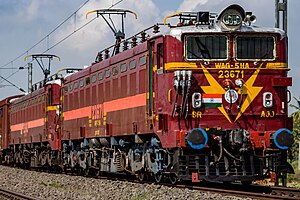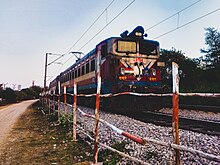| This article needs additional citations for verification. Please help improve this article by adding citations to reliable sources. Unsourced material may be challenged and removed. Find sources: "Indian locomotive class WAG-5" – news · newspapers · books · scholar · JSTOR (August 2024) (Learn how and when to remove this message) |
| WAG-5 | |||||||||||||||||||||||||||||||||||||
|---|---|---|---|---|---|---|---|---|---|---|---|---|---|---|---|---|---|---|---|---|---|---|---|---|---|---|---|---|---|---|---|---|---|---|---|---|---|
 Arakkonam based WAG-5 twins at Avadi. Arakkonam based WAG-5 twins at Avadi. | |||||||||||||||||||||||||||||||||||||
| |||||||||||||||||||||||||||||||||||||
| |||||||||||||||||||||||||||||||||||||
| |||||||||||||||||||||||||||||||||||||
| |||||||||||||||||||||||||||||||||||||
The Indian locomotive class WAG-5 is a class of 25 kV AC electric locomotives that was developed in 1978 by Chittaranjan Locomotive Works for Indian Railways. The model name stands for broad gauge (W), alternating current (A), goods traffic (G) engine, 5th generation (5). They entered service in 1980. A total of 1196 WAG-5 were built at CLW and BHEL between 1978 and 1998, which made them the most numerous class of mainline electric locomotive until the introduction of its successor, the WAG-7.
The WAG-5 is one of the most successful locomotives of Indian Railways currently serving both freight and passenger trains for over 43 years. This class provided the basic design for a number of other locomotives, like WAG-7 and the WCM-6. However, with the advent of new 3-phase locomotives like WAG-9 and WAG-12, the WAG-5 locomotives were relegated to hauling smaller passenger trains and now the aging fleet the WAG-5 locomotives are rapidly being withdrawn from mainline duties and scrapped.
History
This section has multiple issues. Please help improve it or discuss these issues on the talk page. (Learn how and when to remove these messages)
|
WAG-5A is the one with Alstom traction motors. WAG-5B is a converted WAM-4. WAG-5H(x) is with Hitachi traction motors. WAG-5P(x) is a passenger dedicated class. WAG-5(x)D are fitted with dual brakes and WAG-5(x)E are fitted with air brakes. WAG-5RH and WAG-5HR are fitted with Rheostatic or Friction braking. Another variant is WAG-5HG. The units with additional '6P' markings have all parallel grouped traction motors. WAG-5HB is built by BHEL. Some units are fitted with Static Converter (STC), Microprocessor, Dynamic brake resistors (DBR) and SI unit. Due to the advent of WAG-7 and WAG-9, these locos except WAG-5HA/HB are even used for passenger trains although it is a freight-dedicated locomotive. WAG-5HB is homed at Jhansi shed near BHEL's installations for maintenance purposes. WAG-5 has a shell of the WAM-4. Units numbered till 23293 have side louvre and round glass windows like the WAM-4 and units after 23293 have WAG-7 style of Louvre for better ventilation. Recently, WAG-5 have been fitted with data loggers. Unit numbered 23026 was selected by RDSO for adoption of thyristor controlled electricals in 1995. This was done due to the loss of suppliers of tap changer control. Project began in 1992. The new prototype system built in collaboration with Bhabha Atomic Research Centre was fitted in the locomotive between 1997 and 1998. However, due to several problems like interference with signalling equipment, the project was ceased in 1999. The engine was rebuilt to original WAG-5 and designated as WAG-5P.

Technical specification
| This section does not cite any sources. Please help improve this section by adding citations to reliable sources. Unsourced material may be challenged and removed. (August 2024) (Learn how and when to remove this message) |
| Traction Motors | Alstom TAO 659 (575 kW, 750 V, 1070 rpm) or TAO 656; or Hitachi HS 15250A. Axle-hung, nose-suspended. Six motors. |
| Gear Ratio | 62:16 or 62:15 with Alstom motors, some 64:18 (Hitachi motors), many now 58:21 for mixed use. There are also 17:77 |
| Transformer | BHEL, type HETT-3900. 3900 kVA, 22.5 kV, 182 A. 32 taps, 11730 kg, Forced oil cooling, 'A' Insulation. |
| Rectifiers | Silicon rectifiers (two) using 64 S-18FN-350 diodes each from Hind Rectifier. 2700 A / 1050 V per cubicle. 64 cells per bridge. Starting current at 3300 A. Motor (380 V, 970-1460 RPM) |
| Max Haulage capacity | 2375 t (WAG-5 original) |
| Pantographs | Two Faiveley AM-12 of 285 kg with four insulators |
| Current Ratings | 1100 A / 10 min, 750 A continuous |
| Sandboxes | 8 |
| Auxiliaries | 2 Head lights (32 V, 250 W), Lead-acid Battery (50 cells, 110 V) |
| 3 Elgi Compressors | 3 motors (12.5 hp, 380 V) |
| 2 SF India Ltd. Traction Motor blowers | MLBR-42.51-1-H4 type, 2 Siemens Motors (22 kW, 380 V, 41 A, 3000 rpm) |
| 2 SF India Ltd. Smoothing reactor blower | 2 motors(3 hp, 380V, 2860rpm) |
| BHEL Breaking resistor blower | Dy-3423M type, Moto r(532 kW, 70 hp, 325 V, 175 A, 3500 rpm) |
| 2 SF India Ltd. Silicon rectifier blower | Axial type |
| SF India Ltd. Oil cooler blower | MLBH-60-1-H2 type, 22.2 m/hr, Motor (30 hp, 380 V, 6.6 A, 2865 rpm) |
| 2 Smoothing reactors | SL42 type, 1250 V, 950 A, 0.00718 ohms at 110 °C |
| BEST & Co. Pvt. Ltd. Oil pump for transformer | Motor (3.3 kW, 380 V, 6.6 A, 2865 rpm) |
Locomotive sheds
| Zone | Name | Shed Code | Quantity | ||
|---|---|---|---|---|---|
| WAG-5 | WAG-5H | ||||
| Central Railway | Bhusawal | BSLL | 77 | ||
| Eastern Railway | Bardhaman | BWNX | 18 | 36 | |
| Jamalpur | JMPD | 3 | 1 | ||
| East Coast Railway | Visakhapatnam | WATE | 40 | ||
| North Central Railway | Jhansi | JHSE | 106 | ||
| North Eastern Railway | Gonda | GDDX | 28 | ||
| Northern Railway | Lucknow | AMVD | 20 | ||
| Southern Railway | Arakkonam | AJJE | 34 | ||
| Erode | EDDX | 38 | |||
| Ernakulam | ERSX | 5 | |||
| South Central Railway | Vijayawada | BZAE | 36 | ||
| South Eastern Railway | Bondamunda | BNDL | 2 | ||
| Western Railway | Ratlam | RTMD | 91 | ||
| West Central Railway | Itarsi | ETD | 65 | ||
| New Katni Jn. | NKJD | 117 | |||
| Total Locomotives Active as of January 2025 | 717 | ||||
See also
References
External links
| Broad-gauge locomotives of India | ||||||||||
|---|---|---|---|---|---|---|---|---|---|---|
| Steam |
|     | ||||||||
| Diesel |
| |||||||||
| DC electric |
| |||||||||
| AC electric |
| |||||||||
| Dual (AC and DC) electric |
| |||||||||
| Dual mode |
| |||||||||